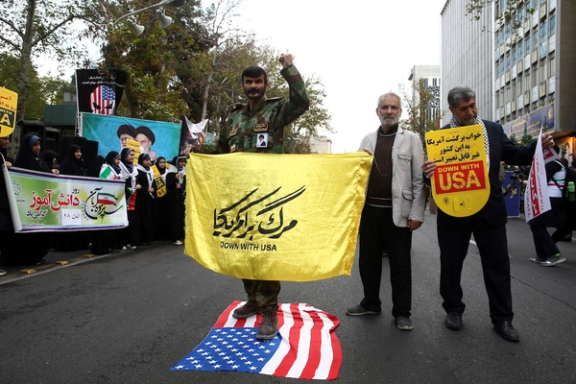Chant first, regret later: the consequences of Iran’s death rhetoric

For Iran’s rulers, wishing death upon enemies is mostly rhetoric—rarely acted on, but often carrying real consequences.

For Iran’s rulers, wishing death upon enemies is mostly rhetoric—rarely acted on, but often carrying real consequences.
“Death to America” has long been a staple: painted on walls, printed on billboards, shouted from pulpits. So too “Death to Israel”, which has grown louder after unrelenting Israeli strikes.
“They bombed a building to kill a commander, and scores of his neighbors were also killed,” one user on X wrote, justifying the chant’s resurgence.
Sometimes, the slogans extend to “Death to England” or France. Germany, despite official anger at its nuclear stance, is spared—not for politics, but for lack of a poetic rhyme in Persian.
At times, the death wishes border on the absurd.
A video once showed an elderly deaf man shouting “David, David Oo-Es-Ah” during a protest in Tehran. Asked what “David” meant, he replied, “David means death!”—a misheard version of “Down with USA.”
In the 1990s, after a man in Denmark burned a Quran, angry crowds in Tehran responded with chants of “Death to Denmark” and torched a popular Danish pastry shop, baffling local shopkeepers.
More recently, a city council member in Rasht called on Israel to assassinate Iran’s new president, Masoud Pezeshkian. The call was so bizarre it drew public ridicule as well as official anger. The councillor later claimed it was a joke.
But some threats aren’t laughed off.
In Qom, senior clerics have openly called on Muslims to kill US president Donald Trump. Though some in Tehran insist these figures don’t speak for the state, one mid-level cleric placed a millions-dollar bounty on Trump and Netanyahu—remarks aired uncensored on state TV.
The rage may stem from Trump’s mockery of supreme leader Ali Khamenei’s claim of victory in the war with Israel. Iran’s Foreign Minister Abbas Araghchi even urged US officials to stop Trump from “insulting the Supreme Leader.”
Khamenei’s adviser Ali Larijani and his brother Mohammad Javad—former parliament speaker and human rights chief respectively—have both issued assassination threats against Trump and France’s Emmanuel Macron.
President Pezeshkian tried to downplay the chants in an interview with Tucker Carlson, arguing they weren’t aimed at the American people or their leaders. But his response felt tone-deaf, failing to acknowledge how offensive these slogans are.
Some argue that hardliners are deliberately stoking these flames to damage the new government and block diplomacy.
“This conduct could prove costly,” conservative analyst Abbas Salimi Namin warned in an interview with Khabar Online on July 9. “State TV must act responsibly... and avoid giving airtime to radicals and troublemakers,” he added.
The reformist website Rouydad24 echoed that concern the same day.
“Radicals fear the national unity forged during and after the war with Israel,” the outlet said in an editorial. “They oppose dialogue and seek to monopolize power. They will stop at nothing to tarnish the government’s image.”
Tweet unavailable